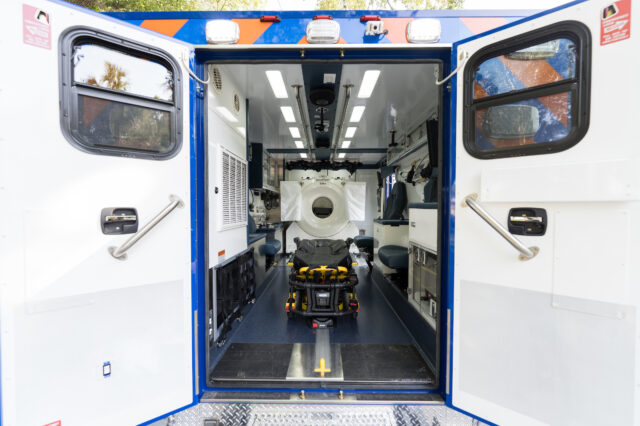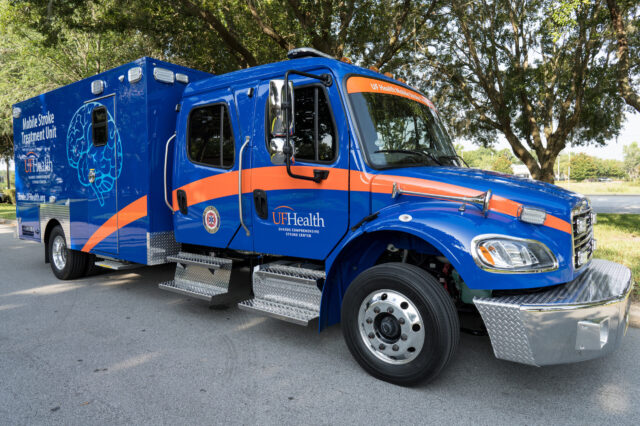UF Health unveils latest advancement in rapid treatment of stroke


Understanding that when someone is suffering from a stroke, brain equals time, UF Health today unveiled its latest effort to speed treatment to patients.
“We are so proud to launch Florida’s first mobile stroke treatment unit network,” said David R. Nelson, M.D., senior vice president for health affairs at UF and president of UF Health. “In health care, time counts. Our mobile stroke treatment unit will save time. But more importantly, it will save lives, greatly reducing the risk of death or disability from a stroke.”
The first new mobile stroke unit will be housed in Gainesville and, in cooperation with Alachua County Fire Rescue, is expected to be deployed by the end of July 2023. Soon after, UF Health will add a unit in Central Florida in The Villages, and, later, in Jacksonville. Only 20 mobile stroke programs are operational nationwide.
UF Health’s mobile stroke units are more than an ordinary ambulance. The specialty vehicles include a diagnostic CT scanner, clot-busting drugs such as Tenecteplase, or TNK, and tissue plasminogen activator, or tPA, medications given intravenously to lower high blood pressure, medications used to reverse the effects of bleeding inside the brain, and telemedicine equipment. Ambulances will be staffed by personnel from UF Health and Alachua County Fire Rescue that includes a stroke-trained nurse, a CT technologist, an EMT driver and paramedic attendant, as well as a stroke neurologist (available via telemedicine).
By deploying to the patient, the team can accurately diagnose and begin the most appropriate treatment while in transit to the nearest available stroke center, saving critical moments which can reduce long-term disability from the stroke.
Studies show improved clinical outcomes for stroke patients transported via a mobile stroke unit versus a standard ambulance, including an increased likelihood of receiving tPA or TNK within an hour — called the “Golden Hour,” because that is when it’s most effective — and a higher probability of avoiding disability following treatment.
“Stroke is the fifth leading primary cause of death and a leading cause of long-term disability in people,” said Anna Khanna, M.D., medical director of the UF Health Shands Comprehensive Stroke Center and an assistant professor of neurology at the UF College of Medicine. “With this new unit, we will bring the treatment to the patient instead of waiting for the patient to arrive at the hospital for care. This reduction in time from onset of symptoms to treatment will not only save lives, but will reduce the amount of disability people have when they survive a stroke. This has a tremendous impact in terms of ongoing quality of life.”
In 2020, someone in the United States died of a stroke roughly every 3 minutes and 17 seconds. In Florida alone, more than 15,000 people die each year from stroke.
Risk factors include hypertension, heart disease, smoking, diabetes and high cholesterol. But stroke can also strike unexpectedly, and more than a third of people who have a stroke are under age 65.
“Everyone should be aware of the acronym ‘FAST’ to help identify if someone is having a stroke: facial drooping, arm weakness, speech difficulties and time to call 911,” Khanna said. “If you notice someone having any of these signs of stroke, call 911 immediately.”
When a stroke is suspected, both EMS and the mobile stroke unit will be dispatched. The stroke team will conduct a neurological evaluation, and if the results are consistent with stroke, treatment will begin immediately.
“We have worked hand-in-hand with our colleagues at Alachua County Fire Rescue,” said Traci d’Auguste, chief operating officer at UF Health Shands. “Our mutual goal is finding the best ways to serve the people of our community.
Chief Harold Theus noted the longtime collaboration between ACFR and UF Health.
“For as long as I can remember, our organizations have sought how best to meet the needs of our community,” he said. “This most recent effort is very rewarding as it will save lives and reduce hardship on people in the future.”
The launch of UF Health’s mobile stroke treatment unit network is driven largely by philanthropy, which will be crucial to sustaining operations and expanding to other areas of the state. A $1.5 million commitment from an anonymous donor spurred planning for a Gainesville-based unit. This was followed shortly by a $1 million contribution from UF Health The Villages Hospital Auxiliary Foundation to support construction of a unit that eventually will be stationed in The Villages.
